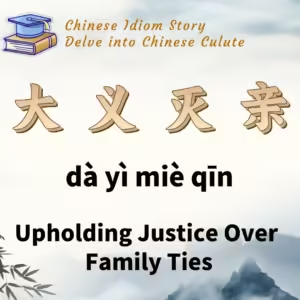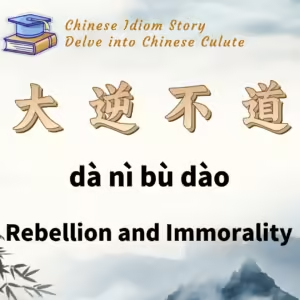
Chinese Idiom: 揭竿而起 (Jie Gan Er Qi)
English Translation: Raise the Pole and Rise
pīn yīn: jiē gān ér qǐ
Idiom Meaning: It metaphorically means to raise the banner of justice and rise in rebellion, often referring to popular uprisings against oppression.
Historical Source: Records of the Grand Historian (Shiji), specifically in the “Biography of Chen She.”
Idiom Story:
In July of 209 BC, local officials in Yangcheng (modern-day Dengfeng, Henan) dispatched two officers to escort 900 impoverished conscripts to Yuyang (now in Miyun District, Beijing) for border defense. These officers selected two strong and capable men from the group as leaders to manage the others. One was named Chen Sheng (also known as Chen She), a hired farmer from Yangcheng, and the other was Wu Guang, a poor farmer from Yangxia. Although they had never met before, their shared plight forged a strong friendship.
As they journeyed northward, the two men were under immense pressure, as failing to meet the deadline set by the Qin Dynasty could result in execution. However, after only a few days of travel, they encountered heavy rain in Daze Township (now southwest of Suzhou, Anhui), forcing them to set up camp until the weather improved. Unfortunately, the rain persisted, and it became clear that they would miss their deadline.
Chen Sheng proposed to Wu Guang that, since either continuing onward or being captured would lead to death, they might as well rebel against the oppressive Qin rule to liberate the people. Wu Guang, who was also insightful, agreed with Chen Sheng’s idea. They decided to rally support in the name of Prince Fusu, who had been wronged by the Qin, and the respected former general of Chu, Xiang Yan (Xiang Yu’s grandfather).
They killed the two officers and displayed their heads to the crowd, explaining that without rebellion, they were doomed to die anyway. This rallying cry inspired hundreds of fellow conscripts to join Chen Sheng and Wu Guang in their fight. They raised the heads on bamboo poles and crafted a large flag emblazoned with the character “楚” (Chu) to symbolize their cause. They swore to unite and overthrow the Qin dynasty in revenge for the injustices suffered.
As the uprising gained momentum, young villagers from Daze Township joined the cause, bringing farming tools like hoes, iron rakes, and wooden sticks as weapons. Without swords or guns, they fashioned wooden blades and used bamboo poles as flags, making Daze Township their base to launch further attacks on nearby counties.
In his essay On the Qin, Han scholar Jia Yi described the situation during the uprising, referring to how they “cut wood for weapons and raised poles for flags.”
Based on this historical account, the idiom “揭竿而起” emerged, symbolizing the spirit of rebellion and the fight against tyranny.






